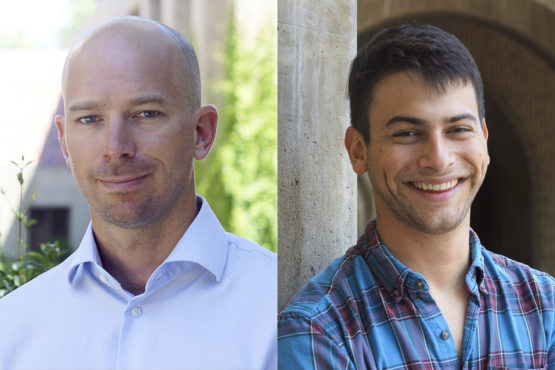Stanford scholars examine issues of expanding genetics research in education
Scholars from Stanford’s Graduate School of Education discuss why parents, educators and policymakers must make sure that as genetics research expands into education, it does not undermine the massive role environments play in a child’s development and learning outcomes.
As researchers learn more about the genes that shape a child’s development – including traits of interest to parents and educators – these discoveries must not distract from the essential need for well-crafted policy and determined teachers in the collective task of educating the next generation, Stanford scholars say.

Benjamin Domingue, left, and Sam Trejo of Stanford’s Graduate School of Education study recent developments in genetics and what they may mean for parents and educators. (Image credit: Hiep Ho)
In a new paper published Feb. 20 in AERA Open, Graduate School of Education’s Benjamin Domingue and Sam Trejo discuss what recent developments in genetics research will mean for parents, educators and policymakers. They say that while genetics can provide valuable insight into human development and behavior – research might one day offer information about ADHD, dyslexia and other learning differences – environments also have immense effects for how a child grows, independent of genetic makeup. This, they urge, must not be ignored.
Here, Domingue, an assistant professor and a faculty fellow at the Stanford Center for Population Health Sciences, and Trejo, a graduate student whose focus is on education, health, genetics and social policy, talk to Stanford News Service about genetics research and education.
Why do you think it is important for educators to consider the impact of genetics research now?
Domingue: We believe that all of society is about to be impacted by genetics research. In the last decade, millions of people have contributed genotypes to corporate and scientific databases. This information may be used to advance our understanding of human disease and development. Genetic scores for traits such as height, BMI, cardiovascular disease and educational attainment are becoming increasingly predictive. Whether we are ready for it or not, genetics are going to play an increasing role in a variety of human endeavors.
As genetics research expands into education, what ethical considerations and practical problems do you see arising?
Trejo: I think the most practical issue for educators is likely to be related to learning disabilities. Research on human genetics might offer new information about developmental pathways for traits like ADHD and dyslexia. In the short term, such information may offer insight into strategies for intervention. In the long run, it may even be useful for individual-level risk prediction. However, there is absolutely no evidence to suggest that virtually all children cannot thrive given the appropriate environmental setting. Providing an environment rich with educational possibilities for all kids should still be a top priority; nothing we’re learning from studies of human genetics seems likely to change that.
You argue that it is important to understand the historical context of genetics in education research. What do you want people to know about this history?
Domingue: Historically, arguments about genetics in education were largely targeted at explaining group differences – for example, arguments of the form “group X performs better at some task than group Y due to genetic differences between X and Y.” As we discuss in the paper, we think arguments of this kind are largely an intellectual dead end. Such arguments tend to minimize both crucially important environmental differences experienced by various groups and the extent to which human ancestral history and the genome are intertwined. Because of these two facts, it is incredibly challenging to construct valid arguments along those lines from genetic data outside of traits that have fairly simple genetic architectures.
We contend that, in contrast, genetics are a useful mechanism for understanding why people from relatively similar backgrounds end up different. Such information is valuable as it stands to offer a great deal of insight about the design of certain educational and policy interventions studied by social scientists. But genetics is a poor tool for understanding why people from manifestly different starting points don’t end up the same. If our paper can help reframe people’s thinking on this point, that would be a hugely important shift.
What are your recommendations to researchers interested in examining the intersection of genetics and education?
Domingue: Given the unique nature of the human genome – it speaks to both our own unique personal histories as well as the broader history of our species – policymakers and researchers need to be especially sensitive when conducting and disseminating research in this area. In particular, acknowledgment of the historical weight of this research may be one way in which we can attempt to avoid past missteps. Even skeptical researchers may be able to help channel genetic research into productive directions by embracing adversarial collaborative efforts. Such efforts will ensure that the concerns of many regarding genetic studies are heard and will also enable more appropriate downstream communication of results to multiple research communities.
Trejo: Genetic influences don’t undermine the need for well-crafted social policy. For example, suppose a common eye problem was entirely due to genetic causes; that might be valuable information in terms of understanding the development of the underlying disease but wouldn’t change the short-term relevance of eyeglasses as a viable policy solution to this problem. Genetic predisposition is not destiny. Indeed, helping those students most at risk of health or sociobehavioral problems is one of the most pressing demands in education.
Domingue and Trejo’s paper, Genetics and Education: Recent Developments in the Context of an Ugly History and an Uncertain Future, was published Feb. 20 in AERA Open. Daphne Martschenko of the University of Cambridge is also a co-author. The research was supported by the Russell Sage Foundation, the Ford Foundation, the National Science Foundation and the Institute of Education Sciences.
